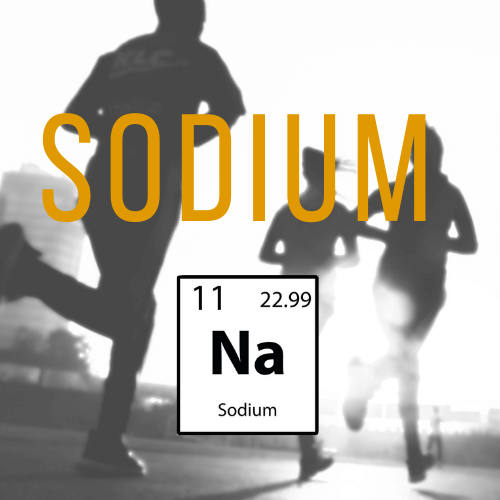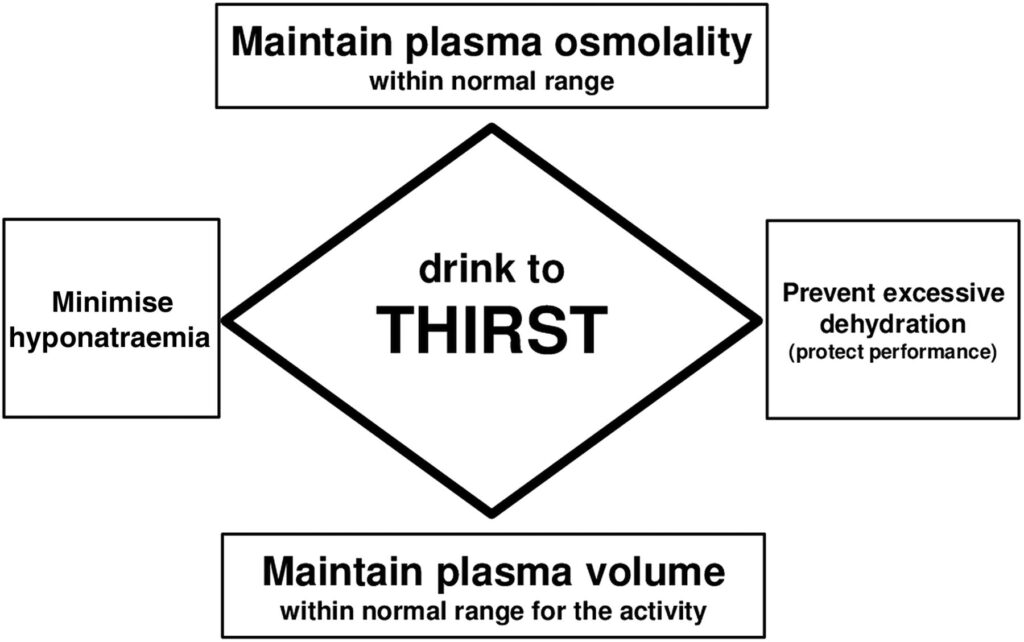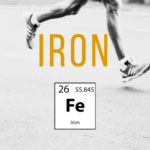Sodium for runners – jump to the part that interests you most:
Why is Sodium Important For Runners?
A lot of physiological changes happen in your body when you exercise, and it works hard to try to stay in balance, a.k.a. maintain homeostasis.
One of those things is plasma osmolality, a water-electrolyte balance that ensures normal liquid pressure in your body and allows your organs to function.
How Does your body do it? Through a complicated process called osmoregulation, which includes osmoreceptor cells located in your anterior hypothalamus. Those cells respond to plasma sodium concentration changes and regulate urine concentration and water reabsorption, as well as thirst.
Another important system that helps to maintain plasma osmolality is the regulation of blood glucose levels by your liver (or your mouth, if you choose to ingest carbs during your run).

Running-Induced Hyponatremia.
To cool down during a run, your body produces sweat – a mixture of water and solutes, mostly sodium chloride. This leads to mild dehydration and triggers thirst. If you rehydrate with pure water, you dilute solutes (mostly sodium) in plasma, which might lead to a condition called hyponatremia – a low sodium level in the blood.
Hyponatremia can be caused by excess sodium loss with sweat, rehydrating with pure water which dilutes sodium in your blood, or both.
Severe hyponatremia is dangerous and can even cause death. Symptoms include vomiting, headache, and behavioral changes like confusion, agitation, and disorientation.
Mild hyponatremia is much more common and can hinder your athletic performance. Symptoms include dizziness, lightheadedness, nausea, puffiness, and weight gain.
How To Avoid Hyponatremia While Running?
There are 2 steps you can take to avoid hyponatremia during a run:
- Always drink to thirst;
- During and after a run that lasts over 2h, or a shorter run in hot weather conditions, rehydrate with a drink containing electrolytes and carbohydrates rather than pure water.

Who (and When) Should Add Sodium To Their Running Hydration Strategy?
If you’re an average runner, with an average body size, your runs are of reasonable duration and it’s not too hot outside – don’t worry about extra electrolyte intake, your body will manage to keep the balance on its own.
However, consider ingesting extra sodium if there are one or more of these risk factors in your run:
- Your run lasts for 2 hours or longer (and for sure if it’s over 4 hours);
- Your run is very intense;
- The weather is very hot and/or humid;
- You have a higher or lower than normal BMI (body mass index);
- You tend to drink a lot of water;
- You tend to sweat more than avarage;
- You have a “salty sweat”.
Scientific studies show that in tropical weather conditions “additional sodium intake during ultramarathons could contribute to faster performances by stimulating thirst, increasing voluntary fluid intake, enhancing intestinal glucose and water absorption, optimizing extracellular and intracellular fluid balance, and potentially mitigating the occurrence of clinically significant episodes of hyponatremia”.
How Much Sodium Should Runners Consume?
An average person produces around 1 liter of sweat and loses around 1g of sodium per hour of a moderate-intensity run. Please notice the words “average” and “around”, as these numbers can be lower or much higher. A bigger, intensely sweating runner in hot weather conditions can lose even up to around 8mg of sodium per hour!
Scientists suggest including anything between 300mg and 1500mg of sodium per liter of your drink of choice, and a typical recommendation is 700mg per liter. However, matching your sweat loss with a drink containing 700mg of sodium per liter for a prolonged period of time might still result in hyponatremia. Think of that number as a “base” and adjust it according to your individual circumstances, such as your sweat rate and saltiness, duration of your run, weather conditions, and your body mass.
In my personal opinion, during a long run It’s better to consume slightly too much sodium rather than too little, provided you don’t have a kidney disease. It’s difficult to overconsume sodium during a run because a) overly salty drinks are unpalatable and will give you nausea, and b) higher-than-necessary sodium intake will make you thirsty and will cause you to drink more fluids and pee out excess sodium.

Sodium Pre-Loading for Runners.
In some circumstances, pre-loading with sodium might be beneficial. One study showed that in hot weather sodium loading might help you exercise for longer and maintain a lower heart rate and body temperature.
If you choose to experiment with sodium loading try a drink containing no more than ~3.7 grams of sodium per liter. Drinks containing above ~2.8 grams per liter may increase gastrointestinal problems during exercise.
Salt Tablets, Gels, and Isotonics for Runners.
A typical “isotonic” sports drink contains 600mg of sodium per liter. This means that trying to match fluid losses with a sports drink might still lead to hyponatremia.
However, most sports gels also contain sodium, so analyze your hydration and nutrition plan and add up all the sodium you’ll be getting from different sources.
If you think that it might still not be enough, salt tablets are a good option. Practice taking them in during your long runs, as they might cause gastrointestinal issues, and tend to dissolve easily in the pockets.
During ultramarathons lasting several hours (or days) prepare plenty of salty food options such as salty pretzels, salted nuts, etc. Your body will naturally crave something salty if your plasma sodium concentrations decrease. As always – listen to your body.
Have a great run!
If you enjoyed this post, you might also like this post about the importance of Iron for runners or this post about Zinc.





0 Comments